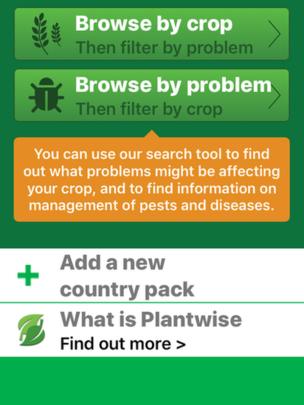UK researchers have developed an early warning system to prevent the crops of African farmers from being devastated.
The Pest Risk Information Service (Prise) combines temperature data and weather forecasts with computer models.
It then sends farmers a mobile phone alert so that they can take precautions.
It is hoped that the system will boost yields and increase farm incomes by up to 20%.
Prise is being used in Kenya, Ghana and Zambia and will be rolled out soon in other parts of the world.
Prise is an upgrade of a highly successful UK Aid scheme run by the Centre for Agriculture and Bioscience International development charity (CABI). It uses a network of so called "plant doctors" and clinics to advise farmers when pests or diseases destroy their crops.

The "doctors" draw on a database using an an app to help them to diagnose the issue and then prescribe the right pesticide and other measures. Walter Wafula, who grows Maize in Bungoma in Kenya, told BBC News that the service had transformed his family's lives.
"Because of the increased income from my farm, my kids can now go to a better school and the life at home has improved because I can provide the basic needs for my family," he said.
So far, the scheme has helped 18.3 million farmers, in 34 countries across Africa, Asia and the Americas. On average farm incomes and yields are 13% higher for those using the service.

The data for the Prise system will be processed by the JASMIN supercomputer data cluster in Oxfordshire
But Prof Charlotte Watts, chief scientific adviser for the UK's Department for International Development, which funds the plant doctor scheme, says a new initiative with CABI and the UK Space Agency (UKSA) will use the network to prevent, rather than just mitigate infestations.
She says the idea is to use satellite data collected by the UKSA to develop a system that is able to predict when pest infestations will strike a week or more in advance.
Satellites can provide accurate land temperature information, which is one of the most important drivers of pest infestations. This, combined with weather data and computer models, can be used to give farmers enough time to spray pesticide and take other precautions.
CABI worked with the UK's Science and Technology Facilities Council, to develop the project. Prof Watts told BBC News that the early indications are that the system is working.
"Farmers are completely dependent on crops and the predictability of having a good yield to survive and also to send their kids to school," she said.
"So if we can reduce the impact of pests, if we can enable them to get better yields - which we are already seeing - it will mean that we can help them move out of poverty."
Latest Stories
-
One arrested as missing UEW lecturer is found buried in his home
3 minutes -
Aflao MoMo vendor’s killing: 65-year-old father of key suspect arrested; 8 now in custody
13 minutes -
Mr. Daniel Kwame Wiafe
20 minutes -
KNUST Architecture students spearhead major peri-urban survey in Yilo Krobo
22 minutes -
UEW Co-operative Credit Union marks 23rd AGM, promotes financial literacy and entrepreneurship among students
28 minutes -
MP Vincent Assafuah petitions ILO over ‘politically-motivated dismissal of public-sector workers
36 minutes -
CJ C’ttee petition: Mahama has “serious problems to tackle”, not “a 20-second restaurant encounter” – Ansa-Asare
45 minutes -
Trump administration revokes Harvard’s ability to enroll foreign students
54 minutes -
Nurture Nature Foundation calls for urgent action to address flood crisis in Accra
58 minutes -
ECG rallies Suame Magazine traders to tackle transformer theft and power vandalism in A/R
1 hour -
Why do we only see the bad? A call for balanced political accountability
1 hour -
Strong Cedi, weak jobs: Ahiagbah warns of economic mismatch
1 hour -
Volta Minister urges smarter leadership, commends Tafi Atome for eco-tourism success
2 hours -
All NPP national executives should be sacked – First Vice Chairman
2 hours -
I moved from radio to TV because I found TV more fun – KSM
2 hours

